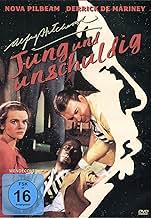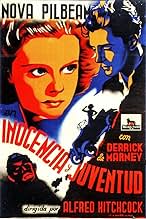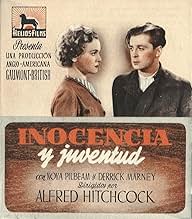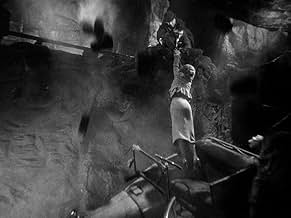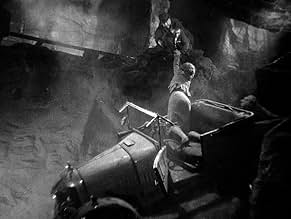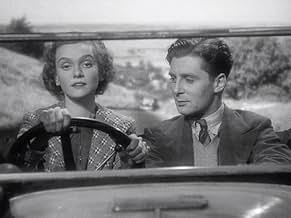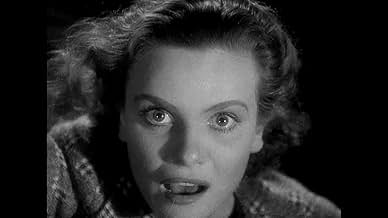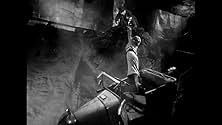VALUTAZIONE IMDb
6,8/10
11.598
LA TUA VALUTAZIONE
Aggiungi una trama nella tua linguaA man on the run from a murder charge enlists the help of a beautiful stranger who must put herself at risk for his cause.A man on the run from a murder charge enlists the help of a beautiful stranger who must put herself at risk for his cause.A man on the run from a murder charge enlists the help of a beautiful stranger who must put herself at risk for his cause.
- Regia
- Sceneggiatura
- Star
- Premi
- 1 vittoria in totale
Derrick De Marney
- Robert Tisdall
- (as Derrick de Marney)
Frank Atkinson
- Petrol Pump Attendant
- (non citato nei titoli originali)
Clive Baxter
- Burgoyne Boy
- (non citato nei titoli originali)
Pamela Bevan
- Little Girl at Party
- (non citato nei titoli originali)
Ernest Borrow
- Policeman Outside Courtroom
- (non citato nei titoli originali)
Recensioni in evidenza
"Young and Innocent" is one of the best of Alfred Hitchcock's pre-Hollywood movies. It contains all of the features that characterized the finest of his British movies, and is (as many others have commented) a film often undeservedly overlooked amongst Hitchcock's large collection of classics.
The actors would all be unfamiliar to most contemporary American viewers, but it is a fine cast that does full justice to a good story, and that responds well to Hitchcock's expert direction. Derrick de Marney is engaging as the unjustly accused hero Robert Tisdall, and his character is balanced nicely by good performances from the rest of the cast (several of whom appeared in more than one of Hitchcock's British movies).
As is often the case with Hitchcock's British pictures, the title is capable of multiple interpretations. At the least, it could refer either to the hero, to the heroine, or to the overall atmosphere and themes of the movie. Young Tisdall is being chased by the law, but we know from the beginning that he is innocent, and his knowledge of that innocence enables him to remain upbeat and even playful despite the dangers and complications he faces. Erica (Nova Pilbeam), his reluctant friend and helper, is innocent in a different sense. In the story she finds her youthful naivete, especially the assumptions she has acquired in growing up as a chief police constable's daughter, challenged by the real world - perhaps for the first time in her life. Pilbeam is not a glamorous heroine (and this may be one of the reasons why "Young and Innocent" is unjustly neglected), but she was a good choice to portray the youthful earnestness and resulting moral dilemmas of her character.
Despite the film's short length, it is filled with classic Hitchcock touches of detail, artistry, and humor, many of which are more low-key than those in his more familiar Hollywood films. It is worth watching several times in order to catch and appreciate all of the details. Three sequences are especially worth noting: (i) the renowned tracking shot at the climax of the film, which is not only a fine technical achievement but also an ideal way to set up the suspenseful conclusion; (ii) the birthday party in the middle, which encapsulates in very subtle ways most of the themes and contrasts of the movie, and (iii) the sequence towards the beginning involving the hero's conference with his lawyer, his court appearance, and his escape, a sequence which is filled with comic details too numerous to catch all at once (including one of the director's most humorous cameos).
Any Hitchcock fan should thoroughly enjoy "Young and Innocent". Beyond that, any fan of thrillers who can look past an unfamiliar cast, and who is willing to look for the subtle touches that characterized the great director's British work, will also find the film a satisfying experience.
The actors would all be unfamiliar to most contemporary American viewers, but it is a fine cast that does full justice to a good story, and that responds well to Hitchcock's expert direction. Derrick de Marney is engaging as the unjustly accused hero Robert Tisdall, and his character is balanced nicely by good performances from the rest of the cast (several of whom appeared in more than one of Hitchcock's British movies).
As is often the case with Hitchcock's British pictures, the title is capable of multiple interpretations. At the least, it could refer either to the hero, to the heroine, or to the overall atmosphere and themes of the movie. Young Tisdall is being chased by the law, but we know from the beginning that he is innocent, and his knowledge of that innocence enables him to remain upbeat and even playful despite the dangers and complications he faces. Erica (Nova Pilbeam), his reluctant friend and helper, is innocent in a different sense. In the story she finds her youthful naivete, especially the assumptions she has acquired in growing up as a chief police constable's daughter, challenged by the real world - perhaps for the first time in her life. Pilbeam is not a glamorous heroine (and this may be one of the reasons why "Young and Innocent" is unjustly neglected), but she was a good choice to portray the youthful earnestness and resulting moral dilemmas of her character.
Despite the film's short length, it is filled with classic Hitchcock touches of detail, artistry, and humor, many of which are more low-key than those in his more familiar Hollywood films. It is worth watching several times in order to catch and appreciate all of the details. Three sequences are especially worth noting: (i) the renowned tracking shot at the climax of the film, which is not only a fine technical achievement but also an ideal way to set up the suspenseful conclusion; (ii) the birthday party in the middle, which encapsulates in very subtle ways most of the themes and contrasts of the movie, and (iii) the sequence towards the beginning involving the hero's conference with his lawyer, his court appearance, and his escape, a sequence which is filled with comic details too numerous to catch all at once (including one of the director's most humorous cameos).
Any Hitchcock fan should thoroughly enjoy "Young and Innocent". Beyond that, any fan of thrillers who can look past an unfamiliar cast, and who is willing to look for the subtle touches that characterized the great director's British work, will also find the film a satisfying experience.
Another wrongfully-accused-man-on-the-run tale from Hitchcock, this time starring Derrick De Marney as a singer accused of murder. He escapes custody with hopes of clearing his name, and gets some unexpected help from Erica (Nova Pilbeam), the daughter of a police inspector. With Percy Marmont, John Longden, Edward Rigby, Mary Clare, Basil Radford, George Curzon, George Merritt, Bill Shine, and Torin Thatcher.
This was becoming well-trod territory for Hitchcock even back in '37, and De Marney & Pilbeam don't quite have the screen charisma of Donat & Carroll, but this is still enjoyable if one keeps their expectations in check. There's some miniature work featuring some trains and cars, and suspenseful mine collapse. The finale, with a band in blackface, may keep this one on the lesser-shown list. Pilbeam was 17 when this was filmed, while her romantic onscreen partner De Marney was 31.
This was becoming well-trod territory for Hitchcock even back in '37, and De Marney & Pilbeam don't quite have the screen charisma of Donat & Carroll, but this is still enjoyable if one keeps their expectations in check. There's some miniature work featuring some trains and cars, and suspenseful mine collapse. The finale, with a band in blackface, may keep this one on the lesser-shown list. Pilbeam was 17 when this was filmed, while her romantic onscreen partner De Marney was 31.
Hitchcock is in a class by himself. I'll give any of his films multiple viewings. The story and structure of "Young and Innocent" resemble "The 39 Steps," with a young woman helping a young man on the run thwart the police and prove his innocence. This film is a standout, though, not because of the story or acting (both charming), but because of a virtuoso bit of directing by the Master, in which the location of the killer is revealed. As I watched the scene unfold for the first time, I remember thinking, "This is what makes Hitchcock Hitchcock." I wish I had never seen any Hitchcock films so I could watch them all again for the first time. His is a brilliant body of work, and this is an often overlooked example of his mastery of the film art.
A truly charming film from the Master of Suspense. Being a rather huge Hitch fan, I recently sought out some lesser known films from his early period. Of those I viewed ("Number 17," & "Murder!" among others) this one was my favorite--among the best of his Pre-Hollywood films. There is the usual mixture of humor and suspense, some nice camera work (including a wonderful precursor to the "key-in-hand" shot of "Notorious"), and most importantly, Nova Pilbeam. I'm not sure how this actress managed to play her scenes SO appealingly, and yet managed to have fallen SO completely off the acting radar. How many people today have her name rattling about their cerebral attic? Virtually none, I'd hazard, and yet she is terrific here--worth the effort of finding the video for her performance alone.
This film certainly is not in the same league as Hitch's best, but still is vastly superior to the average suspense film coming out of Hollywood today--or any other day, for that matter.
This film certainly is not in the same league as Hitch's best, but still is vastly superior to the average suspense film coming out of Hollywood today--or any other day, for that matter.
Aside from the suspense, there are several notable scenes. Two minutes into things, and a man opens a front door. Suddenly facing us just beyond the railing is a roiling wall of water, an angry sea about to pour over us. I grabbed my seat cushion, hoping it would float. Then there's the flop house full of snoring vagrants, dead cockroaches, and peeling paint. Right away, I reached past my highball glass and took the wife's Coke. Topping that, is the drive into the mine tunnel. It's a marvel of special effects and timing, with an effect as stunning, I believe, as anything in today's digitally drenched cinema. Nonetheless, I checked the garage to make sure my car was still on all fours. The final scene was a contrast since I'd just watched a 40's musical with wild-man drummer Gene Krupa. Here, it's like watching a wind-up toy slowly losing its mind.
Nova Pilbeam is not exactly a glamor girl, with her over-sized brow and snub nose; still and all, for an 18 -year old she's one heck of an actress. This is a pretty slender exercise for Hitchcock, nothing terribly profound and a lot like The Thirty-Nine steps of two years before. Too bad De Marney doesn't generate the kind of charisma or sympathy the Robert Donat part calls for. Hitchcock was to plow this furrow of racing against the law a number of times. Here, it's Pilbeam going against her civic duty and constable father to help prove accused murderer De Marney's innocence. Their bond of trust grows over time, showing once more that young love often sees what the law cannot-- at least as far as the movies are concerned.
This may not be top-flight Hitchcock. Still, there are the usual humorous touches, darkly suggestive moments, and imaginative moves with the camera. So if you've got a spare hour and half, see why England should never have allowed that funny looking, fat guy an exit visa.
Nova Pilbeam is not exactly a glamor girl, with her over-sized brow and snub nose; still and all, for an 18 -year old she's one heck of an actress. This is a pretty slender exercise for Hitchcock, nothing terribly profound and a lot like The Thirty-Nine steps of two years before. Too bad De Marney doesn't generate the kind of charisma or sympathy the Robert Donat part calls for. Hitchcock was to plow this furrow of racing against the law a number of times. Here, it's Pilbeam going against her civic duty and constable father to help prove accused murderer De Marney's innocence. Their bond of trust grows over time, showing once more that young love often sees what the law cannot-- at least as far as the movies are concerned.
This may not be top-flight Hitchcock. Still, there are the usual humorous touches, darkly suggestive moments, and imaginative moves with the camera. So if you've got a spare hour and half, see why England should never have allowed that funny looking, fat guy an exit visa.
Lo sapevi?
- QuizAlfred Hitchcock: Outside the courthouse holding a camera as Robert Tisdall (Derrick De Marney) escapes (at about 0:16:10).
- Blooper(at around 50 mins) When Erica Burgoyne and Robert Tisdall have taken refuge at night in a small town by parking her car next to a siding just before where the railroad underpasses a bridge, the entire scene has been staged and shot as an obvious miniature as revealed by three mistakes:
- the somewhat jerky motion and unnatural lighting of an automobile (indicating that it was pulled) as it moves across the bridge above the railroad
- the express train speeding under the bridge drags a length of cord behind it as it disappears from view
- the camera tracking in closer to the parked automobile hidden in the shelter of freight trains on sidings reveals that the figures of Erica and Robert are actually modeled and painted figurines, motionless until the shot suddenly changes to a medium closeup shot of the two actors.
- Citazioni
[last lines]
Erica Burgoyne: Father, don't you think we ought to ask Mr. Tisdall to dinner?
- ConnessioniFeatured in Reputations: Hitch: Alfred the Great (1999)
- Colonne sonoreNo One Can Like the Drummer Man
(uncredited)
Written by Samuel Lerner (as Lerner), Al Goodhart (as Goodhart) and Al Hoffman (as Hoffman)
I più visti
Accedi per valutare e creare un elenco di titoli salvati per ottenere consigli personalizzati
Dettagli
Botteghino
- Lordo in tutto il mondo
- 401 USD
- Tempo di esecuzione1 ora 20 minuti
- Colore
- Proporzioni
- 1.37 : 1
Contribuisci a questa pagina
Suggerisci una modifica o aggiungi i contenuti mancanti

Divario superiore
What is the Brazilian Portuguese language plot outline for Giovane e innocente (1937)?
Rispondi
